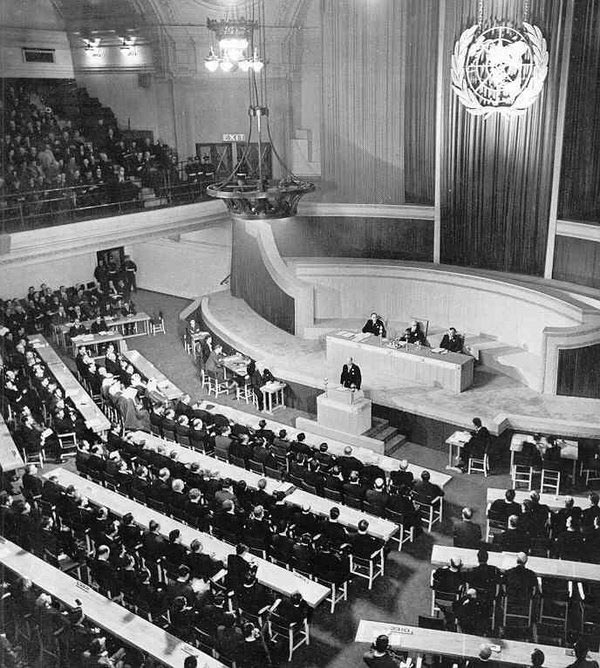United Nations Green from 1946 to today
1946 The first meeting of the UN General Assembly was held in Methodist Central Hall Westminster. British prime minister Clement Attlee told delegates from 54 countries that they would succeed in their new venture only if they brought "the same sense of urgency, the same self-sacrifice and the same willingness to subordinate sectional interests" with which they fought the war.
WE MUST AND WILL SUCCEED

Clement Attlee, addressing the opening session of the United Nations General Assembly
10 January 1946 (Canberra Times, 12 January 1946)
"It is for us to day, bearing in mind the great sacrifices that have been made, to prove ourselves no less courageous in approaching our great task, no less patient and no less self- sacrificing. We must and will succeed.” These concluding words of the Prime Minister, Mr Attlee, in his opening speech brought deafening applause.
The coming of the atomic bomb is only the last of a series of warnings to mankind that unless the powers of destruction could be controlled, immense ruin and almost annihilation would be the lot of a very highly civilised portion of mankind' said Mr Attlee.
I welcome, therefore the decision to remit the whole problem of control of atomic energy to a commission of the United Nations Organisation. We perhaps, in these islands which for so long have been immune from attack behind the barrier of the sea, feel more than any others that we are living in a new age The development of powerful weapons of destruction from distant bases have destroyed the illusion of isolationism The atomic bomb has set clearly before us in tangible form the question that faces the modern world. It is for the peoples of the world through their representatives, to make the choice between life and death.
'We have always with us sceptics and pessimists who will tell you there always has been war and always will be war, who point to the failure of the League of Nations as a reason for scepticism as to the success of the United Nations Organisation, but the progress of civilisation has been one of continual failure and learning by experience To take an example, the history of the trade union movement is marked by failure after failure. After every defeat, the sceptics and the timorous said ‘You cannot get the workers to combine. The self-interest of the individual is too strong. I have intense faith that we will make the United Nations Organisation a success
'We have learnt from past mistakes that the old League of Nations suffered from many disabilities, most of all perhaps because two great nations, the United States and USSR were not present in formative stages. 'To-day, as never before, the world is united. The constitution of the new organisation essentially is realist in that it provides for the sanction of force to support the rule of law. Every individual can be brought to realise that things that are to be discussed in this conference are the concern of all and affect the home life of every man, woman and child. Without social justice and security, there is no real foundation for peace for it is among the socially disinherited and those who have nothing to lose, that the gangster and the aggressor recruit their supporters. Important as is the work of the Security Council, no less vital is to make the Economic and Social Council an effective international instrument. A police force is necessary for part of the civilised community, but the greater the social security and the contentment of the population, the less important is the police force.
"Finally, let us be clear as to what is our ultimate fate. It is not just a negation of war but the creation of a world security and freedom, of a world governed by justice and the moral law: We desire, to assert the pre-eminence of right over might and the general good against selfish sectional aims."

